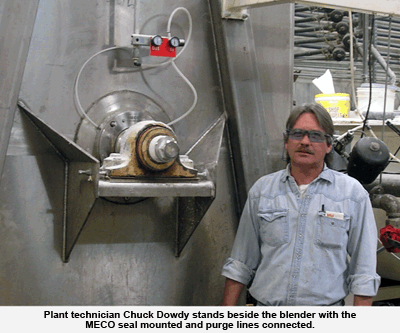The maintenance team replaced the rotating components of the seal, yet it still continued to leak. Plant Manager Alan Wagoner estimated the cost of product loss to be $600.00 per week. An additional cost of operating the MD seals was that they required a nitrogen purge line. Wagoner says that the seals consumed about $336 worth of nitrogen per week. After about a year, Wagoner’s boss saw a case study in a trade magazine about how MECO’s custom shaft seals had solved a problem similar to theirs. Wagoner contacted the regional MECO distributor, Jerry Chevalier of Mid South Mechanical Sealing. Chevalier came to the plant to take shaft measurements and a pair of custom-engineered seals was delivered several weeks later.
MECO engineers specified an AHS-type seal for this application. The patented AH-seal design is based on the familiar MECO concept of using an internal driving elastomer to co-rotate with the shaft and turn a pair of rotors inside the seal cavity. Seal faces are formed between the rotors and the insides of the seal housings, perpendicularly to the shaft . AHS-model seals do not need seal face pressure calibration; snugging the assembly bolts suffices. The seals have a simple adjustment mechanism to compensate for seal face wear over time. The seals are eventually rebuilt by replacing only the rotating components (i.e. drive elastomer and rotors).
MECO AHS seals can be purged with various gas media; Taylor’s seals use clean, dehydrated compressed air. Seal cavity pressure is kept at 2-4 psi higher than the pressure inside the vessel. Purge medium consumption is typically ¼ cfm or less.
Installation of the seals was a relatively simple process because the seals were manufactured completely split. This enabled the team to install without the costly and cumbersome process of removing the shaft and drive from the machine. MECO seal faces are not easily damaged and can be handled without worries throughout the installation process. Chevalier supervised the installation, which was helpful but not necessary; the seals come with detailed installation instructions so it is possible for plant technicians to install the seals without assistance. In this case it took one day to install the two seals.
Two years after installing the MECO seals, Alan Wagoner reports that product leakage is a thing of the past. The seals have run maintenance-free and purge gas costs are negligible. Operators just monitor the cavity pressure to foretell when they will need to adjust or rebuild the seals. This had not yet happened as of this writing.
Wagoner calculates that his seals paid for themselves in less than three months. This is based on just the former weekly cost figures of $600 in lost product and $366 in nitrogen, (not counting the labor costs of cleaning and maintenance).
WF Taylor’s sales have grown to the point where they are now in the market for additional blenders. Wagoner plans to specify that MECO seals be delivered on his new equipment, saying, “These seals are expensive, but they are a great value for the money. They really helped us out.”
Copyright 2007 Woodex Bearing Company, Inc. All rights reserved.


